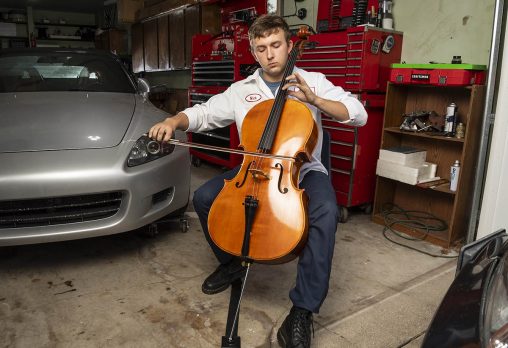
Nick Dunbar, a cello performance major at Wright State, balances a love of music with a passion for automobiles. (Photo by Erin Pence)
To motorsports enthusiasts, the warbling of a high-performance engine’s exhaust is music to the ears. That’s true for Nick Dunbar, but his ear is also attuned to another sort of music — the vibrating of cello strings.
Such is Dunbar’s world, with one hand in the automotive industry and the other in music, as he enters his junior year as a cello performance major at Wright State University.
“My whole life I’ve been about cars and music,” said the Fairborn native.
As he wrapped up his high school career, he decided to study mechanics, which he thought was practical.
“I figured it would be easier to make a career in the automotive industry than as a musician,” he said.
After graduation, he enrolled at the University of Northwest Ohio in Lima, known for its programs in motorsports and diesel and automotive technology. But he did so reluctantly.
“I wasn’t super excited about it — I wanted to do music the whole time,” Dunbar said. “But I knew it would be easy for me to find a job afterward — cars break, and there’s always a need for someone to fix them.”
While he relishes always being a car guy, his background in music goes back far, to the age of 3, when he started playing the piano.
He quit that after a year or so but returned to it, quit and returned again.
“By the time I was 11 my school had auditions for string instruments,” he said. “I wanted to play the upright bass.”
A friend also wanted to play bass, but his family could not afford one, so they got the friend a cello.
“I also went out for cello so that he wouldn’t feel left out,” Dunbar said.
A cellist he became. “The cello came to me much easier than it did to other kids,” Dunbar said. “My orchestra teacher at Fairborn realized I was getting ahead of other kids, and suggested I get a private teacher.”
He started getting serious about the cello after beginning those private lessons and in 2013 joined his first out-of-school orchestra.
He continued with music and mechanics for a time. While he was at Northwest Ohio, he worked for a Dayton machine shop and then out of the blue, got a call from Honda research and development in Marysville. Word had gotten to a recruiter that Dunbar was proficient in modifying Hondas for racing and they wanted to hire him.
While he was at Honda, he continued with cello lessons, from Franklin Cox, Ph.D., who he had studied with since ninth grade. Cox is an associate professor of theory, composition and cello at Wright State. But to focus on his automotive studies and the Honda job, Dunbar took two years off from cello.
Cox then invited Dunbar to audition for Wright State’s cello performance program. He did and enrolled not only for cello but also for business administration, which is his minor. Dunbar said the skill set added by that minor will benefit him in an automotive future.
“Nick is very bright and has a deep love of music,” Cox said. “He is also a fine chamber music performer. Nick is a supportive colleague, performing with multiple ensembles and student groups. We’re very happy to have him in the music program.”
Dunbar has a busy fall semester. In addition to business and cello classes, Honda is hiring him full-time to work on a research and development project.
“I’ll be helping build a prototype car from a bare metal skeleton into a drivable vehicle,” Dunbar said. “It’s a huge project.”
He added that he does not know the nature of the project, and if he did, he could not reveal it. What he can reveal, though, is why he is passionate about music and mechanics.
“It’s the feeling. There’s nothing like taking a car out on the track, and there’s nothing like playing the cello,” he said. “Feeling the strings vibrate at the proper frequencies, working on learning a piece of music and performing it and seeing people’s reaction. What turned this into a passion is the feeling of playing music and observing the effects of it.”
Although he originally chose mechanics over music because of job possibilities, Dunbar now looks at things differently.
“What I want to do is have a career in the automotive field in the day and music at night,” he said.
He credits his Wright State experience for turning that opportunity into a reality.
“Dr. Cox and the string faculty have helped me focus and seek out my potential. I never would’ve been able to do this by myself. There’s not been a single professor who hasn’t helped me in music in some way,” Dunbar said. “What Wright State has given me is the space to improve as a musician and learn from incredibly qualified professors to seek my full potential.”

 Wright State names Rajneesh Suri dean of Raj Soin College of Business
Wright State names Rajneesh Suri dean of Raj Soin College of Business  ‘Only in New York,’ born at Wright State
‘Only in New York,’ born at Wright State  Wright State president, Horizon League leaders welcome new commissioner
Wright State president, Horizon League leaders welcome new commissioner  Wright State celebrates homecoming with week-long block party
Wright State celebrates homecoming with week-long block party  Wright State baseball to take on Dayton Flyers at Day Air Ballpark April 15
Wright State baseball to take on Dayton Flyers at Day Air Ballpark April 15 